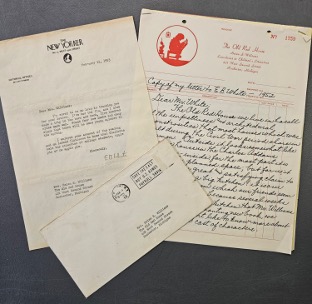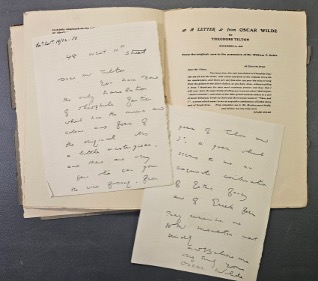Guest Post: Connor Chapman on Ronald Raven Award, 2025
Connor Chapman received a 2025 Ronald Raven Annual Award, a scholarship providing a tuition stipend and a 135-hour internship in the Wayne State University Archives. At the end of his internship, Connor wrote this summary of his experience.
Raven Award Intern Blog Post
In a way, I feel like the Indiana Jones of the archives. The great Dr. Jones is famed for his roguish demeanor, devilishly good looks, and penchant for historical preservation and is known for jumping into action and delving into ancient ruins to find riches in both gold and history. Meanwhile, I, brandishing, if I dare, similar charm and drive, instead prefer to dive into boxes filled to bursting with peoples’ life’s work. There is a great and truly profound joy, I have found, in sifting through the papers of someone, perhaps a professor, perhaps an nurse, perhaps even a loveable bookstore owner. It is a joy in discovering not only that they have storied histories worthy of their own study and observation, but that they intersected with other renowned individuals during their life and work. Sometimes, it is a shock to see a familiar name hidden as a crystal skull along the excavation of an archival collection, but more often there is a sense of elation and, above all, curiosity.
This internship has given me the opportunity to experience history, to hold it in my hands, and see how people, whose livelihoods are laid out before me in boxes and pages, lived and worked in the world. Steel sharpens steel, as they say, and likewise great minds sharpen other great minds, and their works speak to their honed quality.
Over the course of my time at the Reuther Library, I worked on processing five small collections of materials, each with their own unique challenges. Among these collections are the Howard M. Hess Papers, the Katharine E. Faville Papers, and the Yates Hafner Papers. In a few of these collections, I, donning my own wide brimmed hat, delved into the layers of pages and papers to discover, among the humble names of professors, educators, administrators, and storytellers, the names of other great minds present and beckoning as a golden idol upon a pressure plate. It is not these names that make these collections great, but that the presence of the names within these collections serves as the gilding to an otherwise impressive artifact.
While processing the Paul E. Bluemle Papers, I was struck as if by a cracking whip to discover the name of a legendary, and recently portrayed on the silver screen, scientist: Robert Oppenheimer. In a file containing information regarding guest speakers for the Francis Bacon commemorative event held at the Monteith College at Wayne State University, Dr. Oppenheimer was contacted to be a quest speaker, whereupon he agreed to appear. Being myself a scientifically minded man, the sight of Oppenheimer’s name in direct communication with Paul Bluemle and the Monteith College filled me with giddy elation.
Such a finding within this collection highlighted a burgeoning excitement and passion within me for discovering and aiding in the preservation of interesting facets of history. It is made interesting by virtue of Oppenheimer’s presence and name being present in the papers of a professor at Wayne State, such that the intersection of these two people should not only have occurred at all, but that I as an archivist am privy to this otherwise forgotten piece of history.
Similarly, when processing my final collection, the Helen Southgate Williams Papers, with Helen herself being a purveyor of interesting pieces of literary history, I came across a couple of pieces that, in my humble estimation, belong in a museum.
 As Helen was, among a great many other things, a prolific communicator, it is fitting that she saved a letter from an equally prolific author. In her admiration for children’s literature, Williams was an avid fan of E.B. White, author of “Charlotte’s Web.” Thus, Williams wrote to White in 1952 to tell the author that his work has been appreciated by children, college students, and adults alike in her readings and discussions of the book in both her bookstore and collegiate lectures. Much to her delight, White wrote back, complaining, of all things, about having the flu.
As Helen was, among a great many other things, a prolific communicator, it is fitting that she saved a letter from an equally prolific author. In her admiration for children’s literature, Williams was an avid fan of E.B. White, author of “Charlotte’s Web.” Thus, Williams wrote to White in 1952 to tell the author that his work has been appreciated by children, college students, and adults alike in her readings and discussions of the book in both her bookstore and collegiate lectures. Much to her delight, White wrote back, complaining, of all things, about having the flu.
In addition to this personal correspondence with the author, Williams was somehow able to get ahold of an even more interesting piece of history, one so rarified it made me feel, hoping that I will be forgiven for being slightly dramatic, as if I witnessed the opening of the Arc of the Covenant. While delving through the papers of the late Mrs. Williams, imagine my surprise when I come across the first publishing of “The Butterfly Quarterly” from 1907. Tucked between the pages of this aged publication is the real prize of this particular expedition: a handwritten letter by Oscar Wilde.
The letter was not written to Williams. Instead, it was addressed to Theodore Tilton, a newspaper editor in New York, originally written in 1882, wherein Wilde speaks of poetry and a gift, a book, given by Tilton. Though we do not know how this letter, and its accompanying publication and transcription, came to be in the possession of Williams, I am honored and privileged to have had the opportunity to interact with this piece of history.
I am immensely thankful to the Reuther Library and to Ronald Raven for the opportunity to work on these collections and to not only discover, but to also experience the history within these collections. From this internship, I feel as though I finally found my calling, my passion for work. After my first day, I returned home to my wife and told her that this, working in the archive and handling these unprocessed collections of history, was a dream come true, it was everything I ever wanted out of a job. The archives are rejuvenating quietude, a balm for the turbulent soul, and a salve for those weary of the food-service industry.
Though the stacks are lonely, one is never truly alone. Every day, I was able to come to work and, at least for a short time, live with the subjects of the collections. Howard Hess was an innovative engineer and leader within his community. Katherine Faville was a compassionate educator who refused to compromise on her values. Paul Bluemle was a journalist and communicator, respected for his dedication to his craft. Yates Hafer was a poet and philosopher, a leader in his community. Helen Williams was a singularly unique woman, beloved by all around her. I have been privileged to witness but a small portion of their lives and to hold their history in my hands. Alas, the giant rolling boulder of the real world comes barreling toward me, my time at the Reuther coming to an end, and I must run to my next adventure.


 Reddit
Reddit Facebook
Facebook LinkedIn
LinkedIn